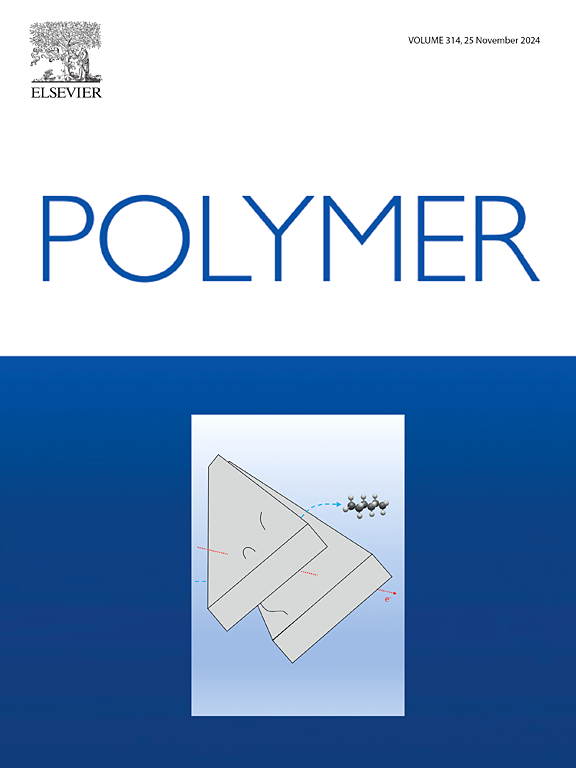高效吸附水中带电有机微污染物的氟化多孔有机聚合物
IF 4.1
2区 化学
Q2 POLYMER SCIENCE
引用次数: 0
摘要
水生有机微污染物,包括药品和工业化学品,在过去一个世纪一直是一个普遍存在的问题,并继续威胁着地球上的生命。传统的水处理方法往往不足以去除这些持久性污染物,因此需要更有效的吸附剂。在这项研究中,我们介绍了一种新型氟化咪唑基共价有机聚合物(FCOP-222),用于选择性去除水中带电的有机微污染物。FCOP-222是由四氟对苯二甲酸乙二醛和氯化铵通过一锅缩聚反应合成的,它结合了咪唑官能团的稳定性和氟化连接剂的疏水和静电性能。从氟的二甲基胺取代中还观察到意想不到的后修饰。FCOP-222对普萘洛尔、磺胺甲恶唑、双氯芬酸等带电微污染物具有高选择性和显著的吸附性能。该材料的活性由静电相互作用和氢键驱动,在很宽的pH范围内提供有效的去除。此外,FCOP-222表现出良好的可重复使用性,在多次循环中保持其吸附能力。这项研究证明了FCOP-222作为一种可扩展的、可持续的解决方案从受污染的水源中去除有害微污染物的潜力,为未来的环境修复技术提供了一条有希望的途径。本文章由计算机程序翻译,如有差异,请以英文原文为准。

Fluorinated porous organic polymers for efficient adsorption of charged organic micropollutants from water
Organic micropollutants, including pharmaceuticals and industrial chemicals, have consistently been a widespread problem for the past century and continue to threaten life on earth. Conventional water treatment methods are often inadequate for removing these persistent contaminants, highlighting the need for more effective adsorbents. In this study, we introduce a novel fluorinated-imidazolinium-based covalent organic polymer (FCOP-222) designed for the selective removal of charged organic micropollutants from water. Synthesized via a one-pot polycondensation reaction using tetrafluoroterephthalaldehyde and ammonium chloride, FCOP-222 combines the stability of imidazolinium functional groups with the hydrophobic and electrostatic properties of fluorinated linkers. An unexpected post-modification was also observed from dimethyl amine substitution of fluorines. FCOP-222 exhibits high selectivity and remarkable adsorption performance for charged micropollutants, including pharmaceuticals such as propranolol, sulfamethoxazole, and diclofenac. The material's activity is driven by electrostatic interactions and hydrogen bonding, providing efficient removal across a wide pH range. Moreover, FCOP-222 shows excellent reusability, maintaining its adsorption capacity over multiple cycles. This study demonstrates the potential of FCOP-222 as a scalable, sustainable solution for the removal of harmful micropollutants from contaminated water sources, offering a promising avenue for future environmental remediation technologies.
求助全文
通过发布文献求助,成功后即可免费获取论文全文。
去求助
来源期刊

Polymer
化学-高分子科学
CiteScore
7.90
自引率
8.70%
发文量
959
审稿时长
32 days
期刊介绍:
Polymer is an interdisciplinary journal dedicated to publishing innovative and significant advances in Polymer Physics, Chemistry and Technology. We welcome submissions on polymer hybrids, nanocomposites, characterisation and self-assembly. Polymer also publishes work on the technological application of polymers in energy and optoelectronics.
The main scope is covered but not limited to the following core areas:
Polymer Materials
Nanocomposites and hybrid nanomaterials
Polymer blends, films, fibres, networks and porous materials
Physical Characterization
Characterisation, modelling and simulation* of molecular and materials properties in bulk, solution, and thin films
Polymer Engineering
Advanced multiscale processing methods
Polymer Synthesis, Modification and Self-assembly
Including designer polymer architectures, mechanisms and kinetics, and supramolecular polymerization
Technological Applications
Polymers for energy generation and storage
Polymer membranes for separation technology
Polymers for opto- and microelectronics.
 求助内容:
求助内容: 应助结果提醒方式:
应助结果提醒方式:


